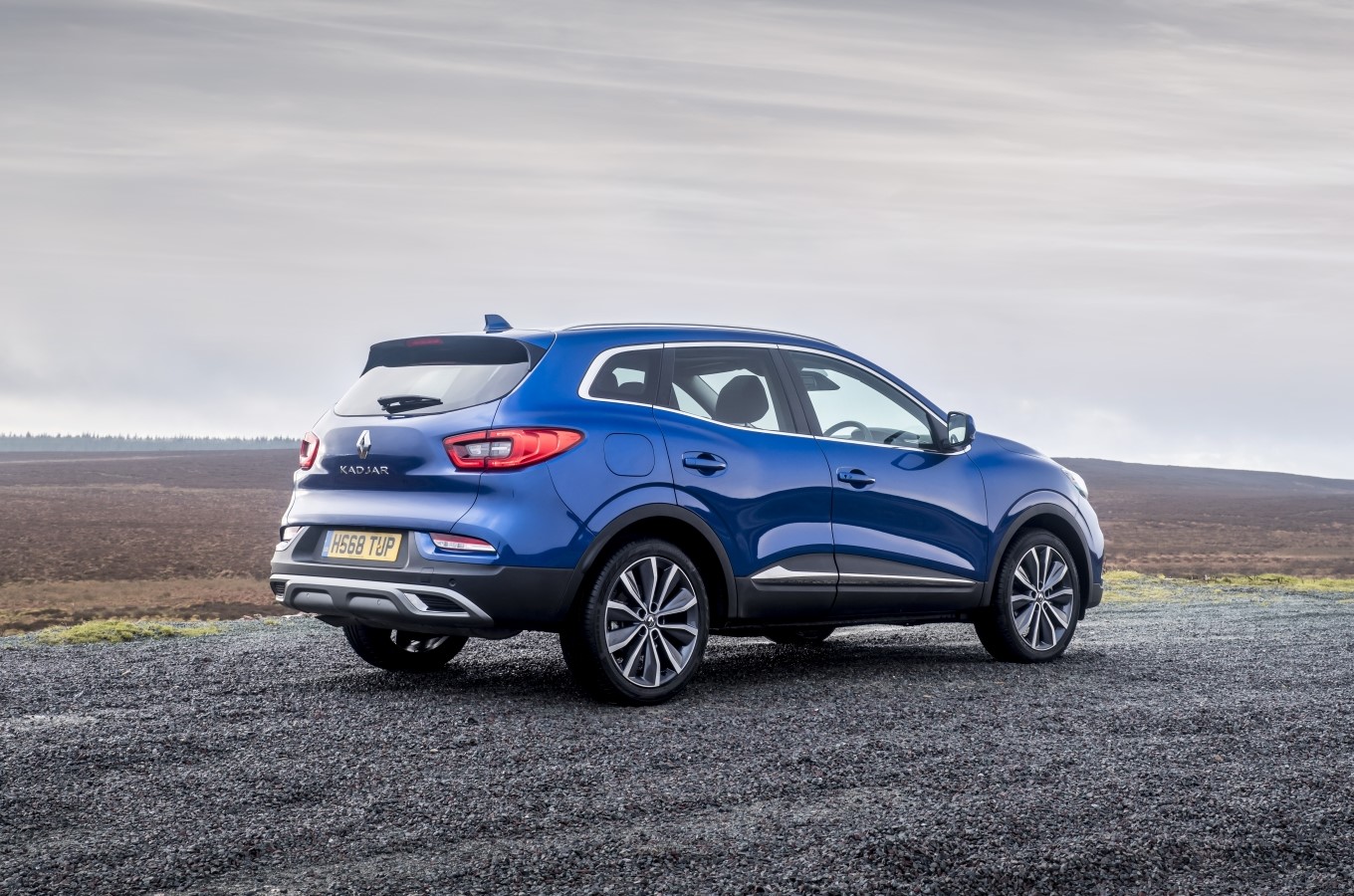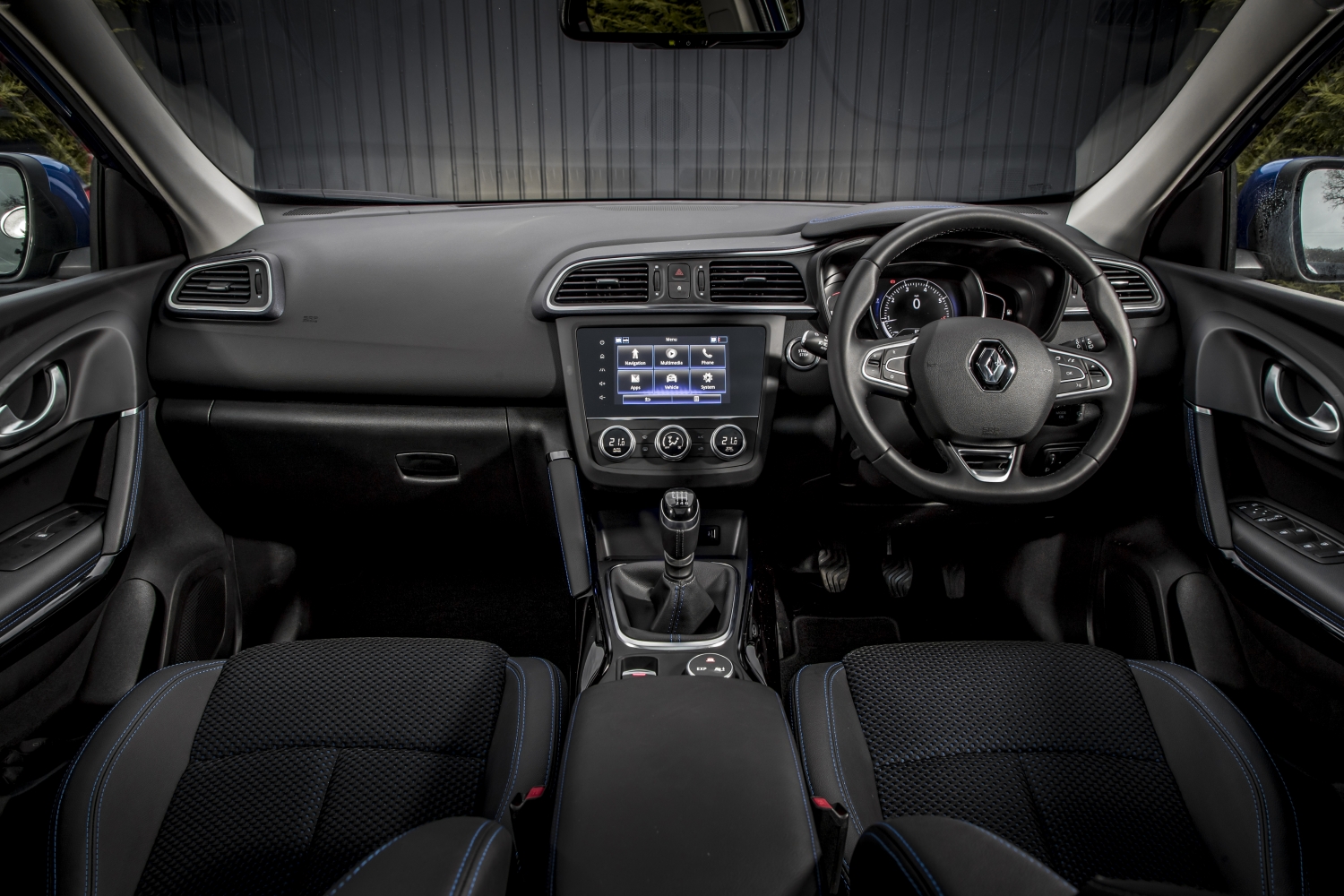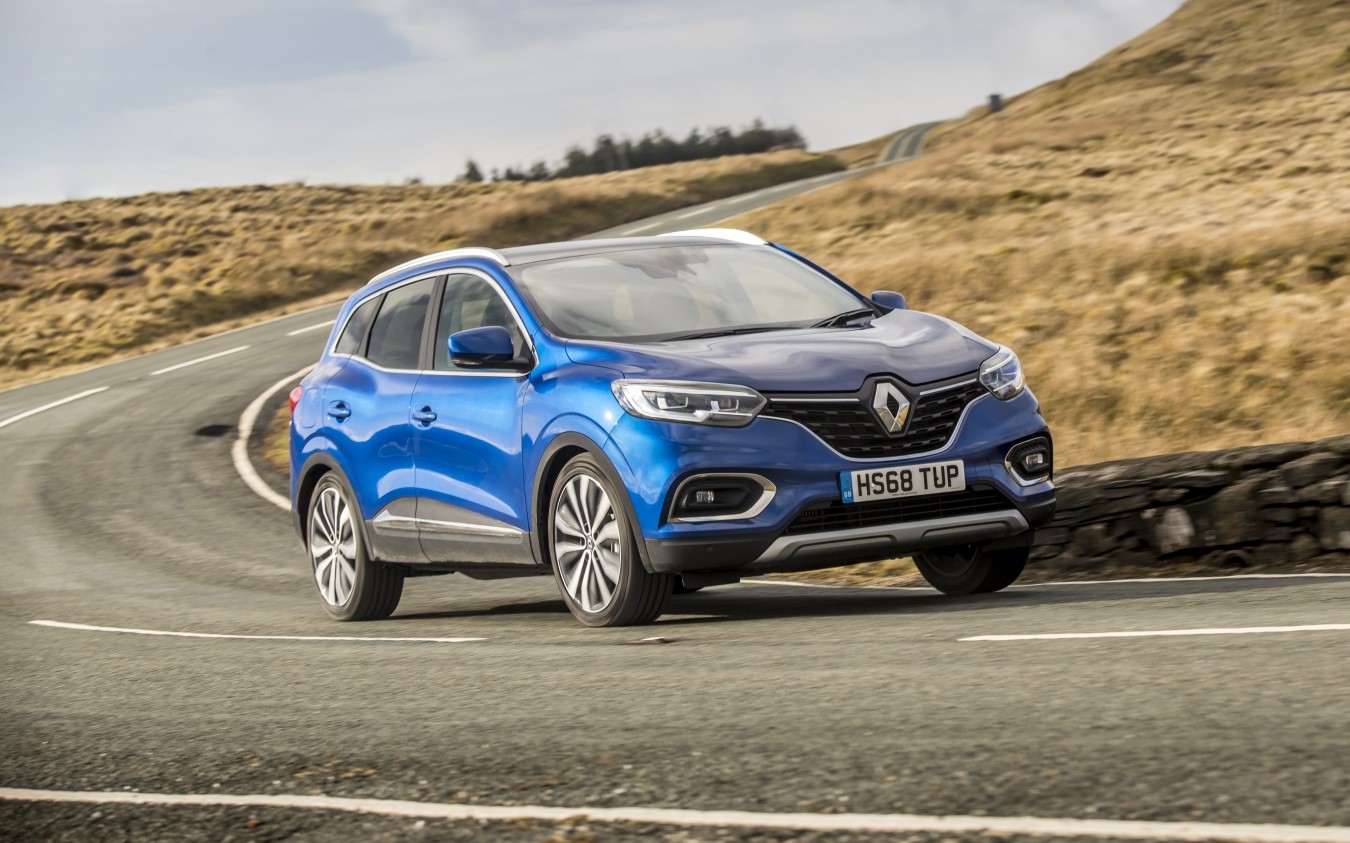
Cheaper than AA or we’ll beat by 20%^
• Roadside cover from £5.49 a month*
• We get to most breakdowns in 60 mins or less
• Our patrols fix 4/5 breakdowns on the spot

The Renault Kadjar is a spacious and well-equipped, yet affordable, family SUV that’s well worth considering as a used buy. But what do you need to know before buying? Our review tells all.
Things you'll like
- Affordable to buy and run
- Roomy and practical
- Good standard equipment levels
Things to consider
- Not the best SUV to drive
- So-so interior quality
- There are more desirable choices
History: What is the 2018-2022 Renault Kadjar?
The Renault Kadjar is a wholly decent family SUV that’s in danger of slowly being lost to the mists of time. Unlike many of the brand’s staple models – the Clio, the Captur and the Megane, for example – the Kadjar name never made it past a single generation.
Its existence came about because Renault was in danger of missing the boat completely. Back in 2015, the SUV revolution of the new car market was in full swing, but while the French brand had the Captur small SUV in its arsenal it didn’t have anything to compete with the Volkswagen Tiguans and Kia Sportages rapidly flooding into the hands of buyers. We’ll gloss over the first-gen Renault Koleos, which wasn’t exactly a roaring success lasting just three years in the UK.
With the Renault-Nissan Alliance in full swing, for its second attempt at a mid-sized SUV Renault had access to pretty much the biggest name in the business: the Nissan Qashqai.
The Kadjar shared much of its underpinnings with the Nissan, then, but (perhaps knowing Renault had to work hard to stand out) it was both slightly cheaper to buy and slightly more spacious inside.
The two brands claimed 60% of parts were shared with new models, but Renault was keen to point out that basically everything you see or touch was different to its Nissan sibling. That means a bold front-end for the Kadjar, along with an interior that is entirely Renault.
By the time 2018 came round the Kadjar had received some mild updates. Not a huge amount changed on the outside, but the cabin got some new switchgear, tech and materials, while the diesel engines were upgraded and the petrol engines ditched for all-new units. It’s this 2018-2022 version – arguably the Kadjar at its best – that we’ll focus on in this review.
Verdict: is the Renault Kadjar a good car?
We reckon the Renault Kadjar is a solid used family SUV buy, particularly thanks to its very keen pricing. But it’s also comfortable, well-equipped, spacious and shouldn’t cost the earth to run.
Sure, a Volkswagen Tiguan is a higher quality, more desirable all-rounder – but you’re looking at a few thousand pounds more for an equivalent spec and age car. Bag yourself a Kadjar with the 1.3 TCe petrol engine and you’ll be laughing all the way to the bank.

Specs and used pricing
Whereas you’ll find far more pre-facelift Kadjars for sale with diesel engines than petrols, the opposite is true of the 2018-on model. It’s clear when the market (and the wider industry) moved away from the fuel.
Regardless, the base 1.5 dCi diesel unit is worth a look, particularly as it meets Euro 6 emissions regulations and is ULEZ compliant. Renault also replaced the old 1.6 dCi diesel with a new 1.7-litre unit in 2018, too. This is the only Kadjar to buy if you want four-wheel drive.
The two new 1.3-litre turbo petrol engines were the stars of the show, however, proving gutsy enough while being far smoother than the diesels and still respectably efficient.
In terms of trim level, even entry-level Play models received a decent kit tally including LED running lights, auto lights and wipers, climate control, cruise control, rear parking sensors and a touchscreen with Apple CarPlay and Android Auto connectivity.
Upgrading to Iconic trim adds front sensors and a reversing camera for easier parking, alongside sat-nav, keyless entry, DAB radio, rear air vents and USB sockets, roof bars and 19-inch alloys. In 2019 an S Edition model added upgraded upholstery, LED headlights, exterior styling enhancements and a panoramic sunroof.
Top-spec GT-Line models added a bit more luxury with full leather upholstery, heated front seats, a 360-degree camera system, puddle lamps and a blind spot monitoring system. Iconic trim is the best bet in terms of value and the modern kit essentials, however.
Prices start from around £6,500 for a higher mileage 2018 Kadjar with the 1.5-litre diesel engine or lower-powered 1.3 petrol, which is very good value when a similar Skoda Karoq can cost thousands more. You can add £1,000 for a higher spec model, while lower-mileage examples sit between £8-9000 even as 2020 models.
Rivals
Pretty much all the major players had an alternative to the Kadjar by 2018. Of course the related Nissan Qashqai is well worth considering with a vast amount of choice on the used market, but we’d also highly recommend the Hyundai Tucson and Kia Sportage as alternatives – both of which offered long warranties from new.
While a Volkswagen Tiguan may be pricier than an equivalent Kadjar it is a very good all-rounder, although there’s better value to be found with the similarly talented SEAT Ateca and Skoda Karoq. Other options include the Mazda CX-5, Peugeot 3008, Vauxhall Grandland and Ford Kuga.
Interior and practicality
You’d hardly describe the cabin of the Renault Kadjar as one brimming with glitz and glamour. It’s not totally drab, and certainly no worse than the Qashqai on which it’s based, but your passengers won’t think they’ve stepped inside a Mercedes-Benz.
The 2018 facelift did bring some welcome revisions, though, including a revised dashboard design replacing the dated touchscreen and fiddly climate controls. Instead, a more neatly integrated screen sat behind a glossy black panel, while the cool rotary ventilation controls with their inset digital displays were a nice touch.
The cabin is mostly solid and modern-feeling, with a decent array of soft-touch plastics. However, owners have reported some trim rattles, while the R-Link 2 touchscreen could be glitchy. It also wasn’t the best system out there when it was working, with slow loading times and lacklustre responses – and it’s a shame the physical shortcut buttons were ditched for touch-sensitive items in 2018. Still, most versions get slick, easy-to-use TomTom navigation, and standard CarPlay and Android Auto connectivity means you can just hook up your phone and forget about the rest. Basic but functional digital instruments were also standard-fit.
The Kadjar’s driving position is good, too, with a decent range of adjustment, a comfortable seat and a commanding view out.

Passenger space, storage and boot space
With dimensions of 4.45m in length and 1.84m in width, the Kadjar was 30mm wider and 50mm longer than the Qashqai on which it’s based. That puts the Renault among the more practical offering in this class of used SUV.
Most of that extra size is concentrated in the rear overhang, so passenger space is broadly similar to the Nissan. You’ll find plenty of room up front for adults of all shapes and sizes, while legroom in the back is good for three children or a pair of adults.
Models equipped with a panoramic sunroof do lose out on headroom for taller adults, though, while the middle seat isn’t as usable as some alternatives thanks to a chunky central tunnel. Wide opening rear doors aid child seat access, but even so a Mazda CX-5 is a roomier choice if outright space matters.
Still, there’s a decent level of storage on board – Renault increase the size of the front door bins to hold bigger bottles, for example. The front cupholders aren’t the deepest, mind, and nor is the centre console bin.
The rear seats aren’t overly flexible, with only a 60/40 split of the rear seat backs and no sliding rear bench like you’d find in a Kia Sportage, for example. But the boot is 42 litres bigger than the Qashqai at 472 litres, and the seat backs can be handily folded via levers in the boot. You also get a two-part adjustable boot floor to aid flexibility further. Even so, a SEAT Ateca or Peugeot 3008 has a bigger boot.
What is a used Renault Kadjar like to drive?
Don’t expect fireworks from the Kadjar on the road; a SEAT Ateca offers a more engaging driving experience. That’s because the Renault’s steering isn’t particularly sharp or confidence-inspiring and there’s a fair degree of body roll in corners. But that’s not necessarily a bad thing.
Where the Kadjar fights back is in offering a comfortable and easy-going driving experience. Avoid the biggest 19-inch wheels (which unsettle the ride) and it does a decent job of smoothing over potholes and rough surfaces, while its most at home on the motorway with a stable feel and low noise levels.
Go for the 4x4 model and you’ll also get a modicum of off-road ability. Sure, it won’t follow a Land Rover Discovery into the wilderness, but with a 50:50 differential lock and a torquey diesel engine the Kadjar won’t be flummoxed by a muddy car park.
Engines
The Kadjar’s engine range was updated with the mid-life refresh in 2018, bringing in some more competitive petrol engines and upgraded diesels.
Don’t immediately discount the diesels as they meet ULEZ and other clean air zone requirements thanks to the addition of AdBlue injection in 2018. Most new buyers had turned their back on the fuel by this point, however, so there is less choice to be found.
Even so, the 115hp 1.5-litre dCi diesel is a decent unit. It received small power and refinement upgrades in 2018, including (oddly) an overboost function adding a temporary bit of extra torque for overtakes. It’s far from swift – 0-62mph takes 11.7 seconds – but it feels gutsy enough in-gear. It’s also reasonably smooth (for a diesel), efficient and well-proven.
The 150hp 1.7-litre diesel engine is a good choice for those looking to tow thanks to its extra muscle. It’s also the only version available with four-wheel drive, but it was also only offered on the GT-Line trim, and there aren’t many around on the used market.
It’s the petrols that are likely to hold more appeal for your average family buyer, though. The TCe 140 and TCe 160 units used a 1.3-litre four-cylinder turbo engine with (you guessed it) 140 or 160hp. Interestingly, it’s an engine developed in conjunction with Daimler, and you’ll find it in the Mercedes-Benz A-Class too.
They’re the most popular engines on the used market and would also be our pick, feeling almost as gutsy as the diesels from low revs but smoother and much quieter. Really, the 140hp version is good enough for most people’s needs.
All engines are available with a (somewhat notchy) six-speed manual gearbox, with some having the option of a reasonably smooth seven-speed dual-clutch automatic.

Ownership, running costs and reliability
If you’re planning on racking up the miles and want to do so as cheaply as possible, the Kadjar 1.5 dCi is an excellent bet. With an official fuel economy figure of 58mpg regardless of which gearbox you have it’s very efficient, which combines with the car’s low purchase price to make it very affordable family transport.
The rarer 1.7-litre diesel is also a strong choice, managing 54mpg combined, although you’ll take a 5mpg hit if you opt for four-wheel drive. The petrols obviously can’t hit those lofty heights, but official figures of between 43 and 45mpg depending on version they’re not exactly thirsty.
Insurance costs for the Kadjar shouldn’t break the bank, though the actual insurance groups are slightly higher than an equivalent Skoda Karoq.
The facelifted version just misses out on the lower tax rates for cars made before April 2017, so all versions pay the same flat rate regardless of emissions. That applies to similarly aged rivals, however.
In terms of reliability, Renault’s historic reputation has been mixed. But the Kadjar’s relationship with Nissan seems to have paid dividends because there are few reported issues beyond some minor electric faults or infotainment system glitches. It’s worth remembering that, from late 2019, Renault offered a five-year warranty as standard – so you’ll find some Kadjars that are still covered.
The main thing to look out for is wear and tear, because the Kadjar is popular with families. You’ll probably see the odd scuff or scrape in the paintwork and wear in the boot area or rear seats – but if that doesn’t bother you it’s a good bargaining chip to lower the price.
Some issues with the car battery not holding charge have been mentioned, too. A full service history is beneficial for piece-of-mind, while visually inspect tyres and brake pads and discs for their condition.
Euro NCAP: is the Renault Kadjar a safe car?
The Renault Kadjar received the maximum five-star safety rating by industry crash test body Euro NCAP back in 2015. With adult occupant protection of 89% it was one of the safest family cars on sale, although the Nissan Qashqai posted similar scores.
Euro NCAP’s rating for the car was valid until 2022 with annual reviews up until then. That means you can’t compare it to five-star cars of today, because the test has become stricter over time. Still, every Kadjar has a suite of airbags and lane departure warning tech, while blind-spot monitoring and traffic sign recognition were standard on top-spec cars – respectable for the time.
Renault Kadjar FAQs
Is the Renault Kadjar discontinued?
Yes, Renault stopped making the Kadjar back in 2022 after only a single generation. It has been replaced by two models: the cheaper Renault Symbioz and the pricier, more premium-focused Renault Austral.
Is the Renault Kadjar reliable?
We have not heard of any specific serious problems with the Kadjar in terms of mechanical reliability –certainly nothing beyond what you’d expect of most used cars, anyway. Electrical glitches and interior quality issues aren’t unheard of, however.
Is the Renault Kadjar bigger than a Nissan Qashqai?
The Renault Kadjar is slightly larger than the Nissan Qashqai on which its based, with around 30mm of extra width and 50mm of extra length. That mainly translates to a bigger boot, as the length is in the rear overhang.









